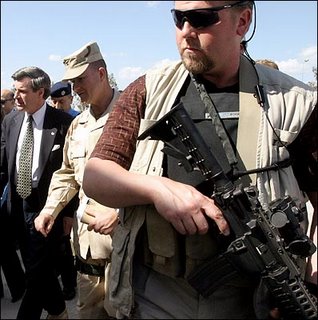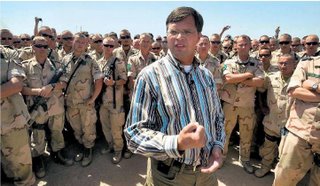South Africa passes mercenaries bill
 Huib
Huib  30-08-2006
30-08-2006 From: CNN.com - South Africa passes controversial mercenaries bill - Aug 29, 2006: "South Africa passes controversial mercenaries bill. POSTED: 1728 GMT (0128 HKT), August 29, 2006
Until the end of the XVIII century, armies were armies of mercenaries. You hired a bunch of Scots, Swiss, Suabes or other people from deprived areas and you could go to war. During the 18th century, the French and Prussian kings started to organize national armies and started forced conscription. This was a big step forward in civilization, for it gave rise to civic statistics, even statistics as such. The Napoleonic armies were completely based on conscription, as were the masses of soldiers who died in the First World War for their different countries. The Second World War, the Korean and Vietnamese Wars were also based on conscription.
Meanwhile, the use of mercenaries never completely disappeared. The British used, and still use, Ghurkas from the Himalayas as elite soldiers, the French have their Foreign Legion, and the policemen and soldiers left over from the South African Apartheid regime offer their services for all dirty work to be done in Africa and elsewhere. We have seen Serbs taking part in genocide operations in the Republic of Congo and Latin American mercenaries, trained in the Panama Canal Zone by the US, intervening as "guerrillas" in different Latin American countries.
 "Contractors" in Iraq, guarding US viceroy (april 2003, Baghdad)
"Contractors" in Iraq, guarding US viceroy (april 2003, Baghdad)In a sound reaction, the South African Government and Parliament have taken steps to put an end to the lawless actions of the former Apartheid officials, engaged for an important part in the Iraq war at this moment:
CAPE TOWN, South Africa (Reuters) -- South Africa passed an anti-mercenaries law on Tuesday that could bar thousands of its nationals from working for security companies in global hotspots such as Iraq and in other national armies.
Defense Minister Mosiuoa Lekota told lawmakers before the bill was passed by an overwhelming majority that one of the intentions of the measure was to stop local mercenaries 'subverting democracy' across Africa.
The government wants to stop civilians and former soldiers -- many trained in the apartheid army -- from fighting or offering security services after South Africans were found to be involved in a number of attempted coups and conflicts in Africa.
'Mercenaries are the scourge of poor areas of the world, especially Africa,' Lekota said.
'Killers for hire, they rent out their skills to the highest bidder regardless of the political agenda,' he said.
But critics say the bill is too wide-ranging and could affect civilians involved in legitimate security work and in other military services, including the British army. The Department of Foreign Affairs has estimated at least 4,000 South Africans are employed in conflict areas around the world, but the actual number may be closer to 20,000.
The bill requires citizens working as security personnel to seek permission from the government and allows certain conflict countries to be declared regulated zones.
The law, which must still be approved by parliament's second house and President Thabo Mbeki, has been widely criticized for infringing on South Africans' rights to freedom of employment.
The British High Commissioner to South Africa appealed for changes to provisions that would impact on about 800 former South African soldiers working in British forces.
HUMAN RIGHTS ABUSES
Lekota said the last two decades had seen the emergence of a global trade in hired guns.
"A number of human rights abuses have been committed by some firms and in many instances their operations have led to a rise in internal tensions and sometimes even military coups in certain states," he said.
About 2,000 South Africans, many trained as soldiers in the apartheid-era military force, are believed to be working in the security sector in Iraq. Several have been killed there.
Lekota said the government was also concerned South Africans could end up fighting for foreign armies in conflicts that contravened international law or Pretoria's foreign policy.
Former South African soldiers were linked to a foiled coup plot in the oil-rich west African state of Equatorial Guinea and in the past were hired as private soldiers in conflict-ridden Sierra Leone.
We intend to delve somewhat deeper into this mercenaries phenomenon. The 1949 Geneva Conventions are very explicit on the prohibition of the use of mercenaries. Listen to what the UN Commissioner had to say about this, in March 2002:
Utilización de mercenarios como medio de violar los derechos humanos y de obstaculizar el ejercicio del derecho de los pueblos a su libre determinación
Intervención del Relator Especial Sr. Enrique Bernales Ballesteros
En los párrafos 53 a 69 de mi informe escrito me ocupo en extenso de la situación actual de las actividades mercenarias. Me remito a ese texto que da amplia cuenta de la actividad mercenaria como un fenómeno de características mundiales. Así, por ejemplo, me ocupo de su extensión, de las modalidades que reviste, de la amplitud de las actividades ilícitas que realizan y hasta de su "modernización", dicho en este caso con el sarcasmo que la situación merece, cuando los mercenarios son presentados como "los buenos muchachos" y cuando se les compara en términos de costo-efectividad con las fuerzas armadas regulares. Los mercenarios se ponen a disposición de empresas privadas de seguridad internacional, que prestan servicios multipropósito con gran eficiencia y profesionalismo, pero donde también, la falta de marcos legales, de escrúpulos éticos y de mecanismos de supervisión y regulación, llevan a algunas de estas empresas a no actuar con respeto al principio de la libre determinación de los pueblos y de goce de los derechos humanos.
This is an outright condemnation, condoned by the American representative at that meeting, of the use of mercenary forces. The next year, the Rumsfeld invasion of Iraq, started an unheard-of deployment of many kinds of mercenaries in Iraq. Even if it would, the regular Army are incapable of controlling their doings.
It is urgent, to do something about this, by way of the UN, but also, like South Africa does, by way of national legislation.

 [EN]
[EN] [FR]
[FR] [DE]
[DE]




